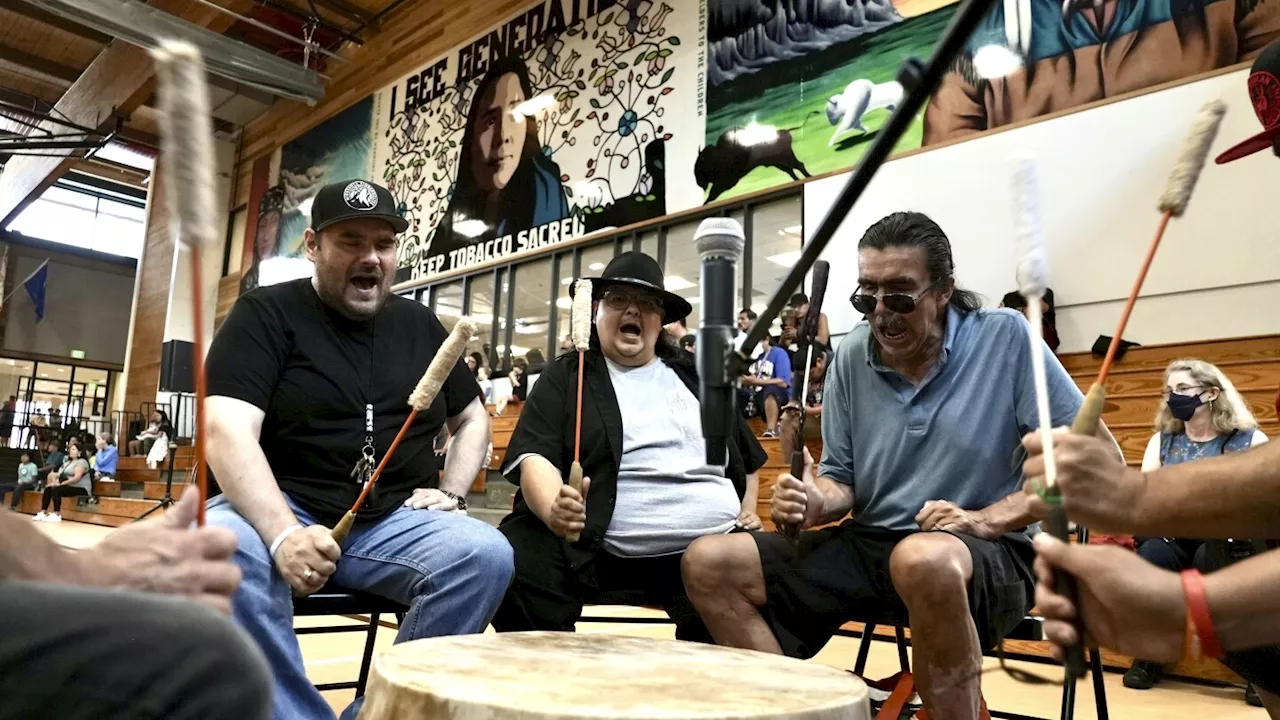When a small-town Minnesota high school banned its Native American drum group from performing at graduation, the hurt reverberated across Indigenous communities in the Upper Midwest.
Mark Erickson, third from left, leads others in singing on the drum during an open drum and dance night at Minneapolis American Indian Center on Wednesday, July 10, 2024, in Minneapolis, Minn. – At summertime social powwows and spiritual ceremonies throughout the Upper Midwest, Native Americans are gathering around singers seated at big, resonant drums to dance, celebrate and connect with their ancestral culture.
“Hopefully this incident doesn’t stop us from doing our spiritual things,” added the mother of four, who grew up in the Twin Cities but identifies with the Mille Lacs Band of Ojibwe, whose tribal lands abut Hinckley. “We had our language, culture and way of life taken away,” said Memegwesi Sutherland, who went to high school in Hinckley and teaches the Ojibwe language at the Minneapolis American Indian Center.
A drum keeper or carrier cares for the drum, often revered as having its own spirit and considered like a relative and not like personal property. Keepers and singers are usually male; according to one tradition, that’s because women can already connect to a second heartbeat when pregnant. That’s why it was meant for the entire graduating class of about 70 students, not only the 21 Native seniors, added Kaiya Wilson, who trained as a back-up singer – and why relegating it to just another extracurricular activity hurt so deeply.
“Nothing can function without that heartbeat,” said Taggart, whose earliest memory of the drum is being held as a toddler at a ceremony. “It’s not just hearing the drums, but you’re feeling it throughout your entire body, and that just connects you more with the spirit connection, more with God.”
United Kingdom Latest News, United Kingdom Headlines
Similar News:You can also read news stories similar to this one that we have collected from other news sources.
 Safeguarding the heartbeat: Native Americans in Upper Midwest protect their drumming traditionWhen a small-town Minnesota high school banned its Native American drum group from performing at graduation, the hurt reverberated across Indigenous communities in the Upper Midwest.
Safeguarding the heartbeat: Native Americans in Upper Midwest protect their drumming traditionWhen a small-town Minnesota high school banned its Native American drum group from performing at graduation, the hurt reverberated across Indigenous communities in the Upper Midwest.
Read more »
 Safeguarding the heartbeat: Native Americans in Upper Midwest protect their drumming traditionWhen a small-town Minnesota high school banned its Native American drum group from performing at graduation, the hurt reverberated across Indigenous communities in the Upper Midwest.
Safeguarding the heartbeat: Native Americans in Upper Midwest protect their drumming traditionWhen a small-town Minnesota high school banned its Native American drum group from performing at graduation, the hurt reverberated across Indigenous communities in the Upper Midwest.
Read more »
 Safeguarding the heartbeat: Native Americans in Upper Midwest protect their drumming traditionWhen a small-town Minnesota high school banned its Native American drum group from performing at graduation, the hurt reverberated across Indigenous communities in the Upper Midwest. That’s because to the Ojibwe, the drum is the heartbeat of their people, and singing with it is a crucial center point of social powwows and spiritual ceremonies.
Safeguarding the heartbeat: Native Americans in Upper Midwest protect their drumming traditionWhen a small-town Minnesota high school banned its Native American drum group from performing at graduation, the hurt reverberated across Indigenous communities in the Upper Midwest. That’s because to the Ojibwe, the drum is the heartbeat of their people, and singing with it is a crucial center point of social powwows and spiritual ceremonies.
Read more »
 Behind Upper Midwest tribal spearfishing is a long and violent history of denied treaty rightsA fraught and violent history for centuries disrupted Indigenous people’s lives in the Upper Midwest, barring them from traditional food gathering practices like spearfishing, hunting and harvesting wild rice.
Behind Upper Midwest tribal spearfishing is a long and violent history of denied treaty rightsA fraught and violent history for centuries disrupted Indigenous people’s lives in the Upper Midwest, barring them from traditional food gathering practices like spearfishing, hunting and harvesting wild rice.
Read more »
 Behind Upper Midwest tribal spearfishing is a long and violent history of denied treaty rightsA fraught and violent history for centuries disrupted Indigenous people’s lives in the Upper Midwest, barring them from traditional food gathering practices like spearfishing, hunting and harvesting wild rice.
Behind Upper Midwest tribal spearfishing is a long and violent history of denied treaty rightsA fraught and violent history for centuries disrupted Indigenous people’s lives in the Upper Midwest, barring them from traditional food gathering practices like spearfishing, hunting and harvesting wild rice.
Read more »
 Behind Upper Midwest tribal spearfishing is a long and violent history of denied treaty rightsA fraught and violent history for centuries disrupted Indigenous people’s lives in the Upper Midwest, barring them from traditional food gathering practices like spearfishing, hunting and harvesting wild rice.
Behind Upper Midwest tribal spearfishing is a long and violent history of denied treaty rightsA fraught and violent history for centuries disrupted Indigenous people’s lives in the Upper Midwest, barring them from traditional food gathering practices like spearfishing, hunting and harvesting wild rice.
Read more »
